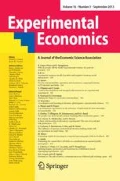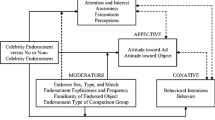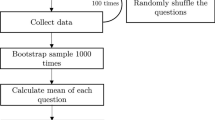Abstract
We develop a method to assess population knowledge about any given topic. We define, and rationalize, types of beliefs that form the ‘knowledge spectrum’. Using a sample of over 7000 UK residents, we estimate these beliefs with respect to three topics: an animal-based diet, alcohol consumption and immigration. We construct an information-campaign effectiveness index (ICEI) that predicts the success of an information campaign. Information resistance is greatest for animal-based diets, and the ICEI is highest for immigration. We test the predictive power of our ICEI by simulating information campaigns, which produces supportive evidence. Our method can be used by any government or company that wants to explore the success of an information campaign.

Similar content being viewed by others
Notes
We found no statistical differences across treatments within topics for the control questions (Kruskal-Wallis equality-of-populations rank test; diet: \(p=0.321\), alcohol: \(p=0.802\), political self-placement: \(p=0.259\)).
We found no statistical differences between H-NL and H-NL-Info within topics for the control questions (Mann-Whitney U test; diet: p = 0.39, alcohol: p = 0.35, political self-placement: p = 0.50).
Note that this questionnaire included an ‘I don’t know’ answer option.
References
Akerlof, G. A., & Dickens, W. T. (1982). The economic consequences of cognitive dissonance. American Economic Review, 72(3), 307–319.
Aleksandrowicz, L., Green, R., Joy, E. J., Smith, P., & Haines, A. (2016). The impacts of dietary change on greenhouse gas emissions, land use, water use, and health: A systematic review. PloS one, 11(11), e0165797.
Alesina, A., Miano, A., & Stantcheva, S. (2018). Immigration and redistribution. National Bureau of Economic Research: Technical report 24733. https://doi.org/10.3386/w24733.
Anderson, K. B. (2019). France’s yellow vests: A self-mobilised mass movement with insurrectionist overtones. Green Left Weekly, 1207, 1.
Andrews, D. W. (2000). Inconsistency of the bootstrap when a parameter is on the boundary of the parameter space. Econometrica, 68(2), 399–405.
Antoniou, C., Doukas, J. A., & Subrahmanyam, A. (2013). Cognitive dissonance, sentiment, and momentum. Journal of Financial and Quantitative Analysis, 48(1), 245–275.
Aune, D., Ursin, G., & Veierød, M. (2009). Meat consumption and the risk of type 2 diabetes: A systematic review and meta-analysis of cohort studies. Diabetologia, 52(11), 2277–2287.
Bem, D. J. (1967). Self-perception: An alternative interpretation of cognitive dissonance phenomena. Psychological Review, 74(3), 183.
Bénabou, R., & Tirole, J. (2002). Self-confidence and personal motivation. Quarterly Journal of Economics, 117(3), 871–915.
Benabou, R., & Tirole, J. (2006). Belief in a just world and redistributive politics. Quarterly Journal of Economics, 121(2), 699–746.
Berners-Lee, M., Hoolohan, C., Cammack, H., & Hewitt, C. (2012). The relative greenhouse gas impacts of realistic dietary choices. Energy Policy, 43, 184–190.
Bouchery, E. E., Harwood, H. J., Sacks, J. J., Simon, C. J., & Brewer, R. D. (2011). Economic costs of excessive alcohol consumption in the US, 2006. American Journal of Preventive Medicine, 41(5), 516–524.
Brehm, J. W., & Cohen, A. R. (1962). Explorations in cognitive dissonance. NJ: Wiley.
Bullock, J. G., Gerber, A. S., Hill, S. J., & Huber, G. A. (2015). Partisan bias in factual beliefs about politics. Quarterly Journal of Political Science, 10, 519–578.
Camerer, C. F., & Hogarth, R. M. (1999). The effects of financial incentives in experiments: A review and capital-labor-production framework. Journal of Risk and Uncertainty, 19(1–3), 7–42.
Caviola, L., Everett, J. A., & Faber, N. S. (2019). The moral standing of animals: Towards a psychology of speciesism. Journal of Personality and Social Psychology, 116(6), 1011–1029.
Chang, T. Y., Solomon, D. H., & Westerfield, M. M. (2016). Looking for someone to blame: Delegation, cognitive dissonance, and the disposition effect. The Journal of Finance, 71(1), 267–302.
Cook, P. J., & Moore, M. J. (2002). The economics of alcohol abuse and alcohol-control policies. Health Affairs, 21(2), 120–133.
Cooper, J. (2007). Cognitive dissonance: 50 years of a classic theory. US: Sage.
Di Tella, R., Galiant, S., & Schargrodsky, E. (2007). The formation of beliefs: Evidence from the allocation of land titles to squatters. Quarterly Journal of Economics, 122(1), 209–241.
Dickinson, D. L., & Oxoby, R. J. (2011). Cognitive dissonance, pessimism, and behavioral spillover effects. Journal of Economic Psychology, 32(3), 295–306.
Ehrich, K. R., & Irwin, J. R. (2005). Willful ignorance in the request for product attribute information. Journal of Marketing Research, 42(3), 266–277.
Elinder, M. (2012). Correcting mistakes: Cognitive dissonance and political attitudes in Sweden and the United States. Public Choice, 153(1–2), 235–249.
Elliot, A. J., & Devine, P. G. (1994). On the motivational nature of cognitive dissonance: Dissonance as psychological discomfort. Journal of Personality and Social Psychology, 67(3), 382.
Elwood, P. C., Pickering, J. E., Givens, D. I., & Gallacher, J. E. (2010). The consumption of milk and dairy foods and the incidence of vascular disease and diabetes: An overview of the evidence. Lipids, 45(10), 925–939.
Erb, K.-H., Lauk, C., Kastner, T., Mayer, A., Theurl, M. C., & Haberl, H. (2016). Exploring the biophysical option space for feeding the world without deforestation. Nature Communications, 7, 11382.
Espinosa, R. (2019). L’éléphant dans la pièce. Revue d’Economie Politique, 129, 287–324.
Facchini, G., Margalit, Y., & Nakata, H. (2016). Countering public opposition to immigration: The impact of information campaigns, CEPR Discussion Paper No. DP11709.
Fernbach, P. M., Light, N., Scott, S. E., Inbar, Y., & Rozin, P. (2019). Extreme opponents of genetically modified foods know the least but think they know the most. Nature Human Behaviour, 3, 251–256.
Festinger, L. (1962). A theory of cognitive dissonance (Vol. 2). Redwood City: Stanford University Press.
Freddi, E. (2017). Do people avoid morally relevant information? Evidence from the refugee crisis. Center Discussion Paper Series No. 2017-034.
Gehrsitz, M. & Ungerer, M. (2017). Jobs, crime, and votes: a short-run evaluation of the refugee crisis in Germany. IZA Discussion Paper, (1094).
Goetzmann, W. N., & Peles, N. (1997). Cognitive dissonance and mutual fund investors. Journal of Financial Research, 20(2), 145–158.
Goldsmith, A. H., Sedo, S., Darity, W, Jr., & Hamilton, D. (2004). The labor supply consequences of perceptions of employer discrimination during search and on-the-job: Integrating neoclassical theory and cognitive dissonance. Journal of Economic Psychology, 25(1), 15–39.
Golman, R., Hagmann, D., & Loewenstein, G. (2017). Information avoidance. Journal of Economic Literature, 55(1), 96–135.
Graça, J., Calheiros, M. M., & Oliveira, A. (2016). Situating moral disengagement: Motivated reasoning in meat consumption and substitution. Personality and Individual Differences, 90, 353–364.
Grewenig, E., Lergetporer, P., Werner, K., & Smarzynska Javorcik, B. (2020). Incentives, search engines, and the elicitation of subjective beliefs: Evidence from representative online survey experiments. Journal of Econometrics. https://doi.org/10.1016/j.jeconom.2020.03.022.
Griggs, I. (2018). UK government to run more than 140 campaigns in 2018/19. PR Week, https://www.prweek.com/article/1463220/uk--government--run--140--campaigns--2018--19.
Grigorieff, A., Roth, C., & Ubfal, D. (2018). Does information change attitudes towards immigrants? representative evidence from survey experiments. Representative Evidence from Survey Experiments (March 10, 2018). Available at SSRN: https://ssrn.com/abstract=2768187. https://doi.org/10.2139/ssrn.2768187.
Grossman, Z., & Van Der Weele, J. J. (2017). Self-image and willful ignorance in social decisions. Journal of the European Economic Association, 15(1), 173–217.
Hestermann, N., Le Yaouanq, Y., & Treich, N. (2018). An economic model of the meat paradox. European Economic Review, 129, 103569.
Ho, E., Hagmann, D., & Loewenstein, G. (2020). Measuring information preferences. Management Science (forthcoming).
Holmes, A. J., & Anderson, K. (2017). Convergence in national alcohol consumption patterns: New global indicators. Journal of Wine Economics, 12(2), 117–148.
Hu, F. B., Rimm, E. B., Stampfer, M. J., Ascherio, A., Spiegelman, D., & Willett, W. C. (2000). Prospective study of major dietary patterns and risk of coronary heart disease in men. The American Journal of Clinical Nutrition, 72(4), 912–921.
Joy, M. (2011). Why we love dogs, eat pigs, and wear cows: An introduction to carnism. US: Conari Press.
Konow, J. (2000). Fair shares: Accountability and cognitive dissonance in allocation decisions. American Economic Review, 90(4), 1072–1091.
Larsson, S. C., & Orsini, N. (2013). Red meat and processed meat consumption and all-cause mortality: A meta-analysis. American Journal of Epidemiology, 179(3), 282–289.
Loughnan, S., Bastian, B., & Haslam, N. (2014). The psychology of eating animals. Current Directions in Psychological Science, 23(2), 104–108.
Mäkelä, K. (1997). Drinking, the majority fallacy, cognitive dissonance and social pressure. Addiction, 92(6), 729–736.
Matthey, A., & Regner, T. (2011). Do I really want to know? a cognitive dissonance-based explanation of other-regarding behavior. Games, 2(1), 114–135.
McNally, A. M., Palfai, T. P., & Kahler, C. W. (2005). Motivational interventions for heavy drinking college students: Examining the role of discrepancy-related psychological processes. Psychology of Addictive Behaviors, 19(1), 79.
Micha, R., Michas, G., & Mozaffarian, D. (2012). Unprocessed red and processed meats and risk of coronary artery disease and type 2 diabetes-an updated review of the evidence. Current Atherosclerosis Reports, 14(6), 515–524.
Morris, J. (2019). Count 14. Alcohol Policy UK: NHS Scotland campaign and debate on the future of alcohol guidelines. https://www.alcoholpolicy.net/alcohol_campaigns/.
Nyborg, K. (2011). I don’t want to hear about it: Rational ignorance among duty-oriented consumers. Journal of Economic Behavior and Organization, 79(3), 263–274.
Orlich, M. J., Singh, P. N., Sabaté, J., Jaceldo-Siegl, K., Fan, J., Knutsen, S., et al. (2013). Vegetarian dietary patterns and mortality in adventist health study 2. JAMA Internal Medicine, 173(13), 1230–1238.
Oxoby, R. J. (2004). Cognitive dissonance, status and growth of the underclass. Economic Journal, 114(498), 727–749.
Pan, A., Sun, Q., Bernstein, A. M., Schulze, M. B., Manson, J. E., Stampfer, M. J., et al. (2012). Red meat consumption and mortality: Results from 2 prospective cohort studies. Archives of Internal Medicine, 172(7), 555–563.
Pan, A., Sun, Q., Bernstein, A. M., Schulze, M. B., Manson, J. E., Willett, W. C., et al. (2011). Red meat consumption and risk of type 2 diabetes: 3 cohorts of us adults and an updated meta-analysis. The American Journal of Clinical Nutrition, 94(4), 1088–1096.
Piazza, J., & Loughnan, S. (2016). When meat gets personal, animals’ minds matter less: Motivated use of intelligence information in judgments of moral standing. Social Psychological and Personality Science, 7(8), 867–874.
Piazza, J., Ruby, M. B., Loughnan, S., Luong, M., Kulik, J., Watkins, H. M., et al. (2015). Rationalizing meat consumption. the 4Ns. Appetite, 91, 114–128.
Prior, M., Sood, G., Khanna, K., et al. (2015). You cannot be serious: The impact of accuracy incentives on partisan bias in reports of economic perceptions. Quarterly Journal of Political Science, 10(4), 489–518.
Quarterly, F. (2016). Quarter 4, october-december 2015. Warszawa: Frontex.
Rabin, M. (1994). Cognitive dissonance and social change. Journal of Economic Behavior and Organization, 23(2), 177–194.
Reynolds, J. (2014). Government Ad spend to increase by 22 percent to almost £300m. the Guardian, https://www.theguardian.com/media/2014/may/14/governemnet--ad--spend--deficit--scottish--referendum--afghanistan.
Rothgerber, H. (2014). Efforts to overcome vegetarian-induced dissonance among meat eaters. Appetite, 79, 32–41.
Schulze, M. B., Hoffmann, K., Manson, J. E., Willett, W. C., Meigs, J. B., Weikert, C., et al. (2005). Dietary pattern, inflammation, and incidence of type 2 diabetes in women. The American Journal of Clinical Nutrition, 82(3), 675–684.
Sekeris, P. & Vasilakis, C. (2016). The Mediterranean refugees crisis and extreme right parties: Evidence from Greece. MPRA paper 72222
Serra-Garcia, M., & Szech, N. (2019). The (in) elasticity of moral ignorance. CESifo Working Paper No. 7555.
Sinha, R., Cross, A. J., Graubard, B. I., Leitzmann, M. F., & Schatzkin, A. (2009). Meat intake and mortality: A prospective study of over half a million people. Archives of Internal Medicine, 169(6), 562–571.
Song, Y., Manson, J. E., Buring, J. E., & Liu, S. (2004). A prospective study of red meat consumption and type 2 diabetes in middle-aged and elderly women: The women’s health study. Diabetes Care, 27(9), 2108–2115.
Springmann, M., Godfray, H. C. J., Rayner, M., & Scarborough, P. (2016). Analysis and valuation of the health and climate change cobenefits of dietary change. Proceedings of the National Academy of Sciences, 113(15), 4146–4151.
Steele, C. M., Southwick, L. L., & Critchlow, B. (1981). Dissonance and alcohol: Drinking your troubles away. Journal of Personality and Social Psychology, 41(5), 831.
Steinmayr, A. (2016). Exposure to refugees and voting for the far-right:(unexpected) results from Austria. IZA Discussion Paper No. 9790.
Tilman, D., & Clark, M. (2014). Global diets link environmental sustainability and human health. Nature, 515(7528), 518.
WHO (2018). Global status report on alcohol and health 2018.
Zimmermann, F. (2019). The dynamics of motivated beliefs. American Economic Review, 110, 337–361.
Author information
Authors and Affiliations
Corresponding author
Additional information
Publisher's Note
Springer Nature remains neutral with regard to jurisdictional claims in published maps and institutional affiliations.
We would like to thank Georg Granic, Nicolas Treich, Andrew Clark, the editor and three anonymous referees for useful comments, as well as participants in various seminars (BETA Strasbourg, LESSAC Dijon, and CREM Rennes) and conferences (ASFEE 2019 Toulouse). We are also grateful to ERIM, NWO (Veni Grant 016.155.026, and Vidi Grant 195.061), ANR (Grant ANR-19-CE21-0005-01) for financial support.
Electronic supplementary material
Below is the link to the electronic supplementary material.
Rights and permissions
About this article
Cite this article
Espinosa, R., Stoop, J. Do people really want to be informed? Ex-ante evaluations of information-campaign effectiveness. Exp Econ 24, 1131–1155 (2021). https://doi.org/10.1007/s10683-020-09692-6
Received:
Revised:
Accepted:
Published:
Issue Date:
DOI: https://doi.org/10.1007/s10683-020-09692-6




